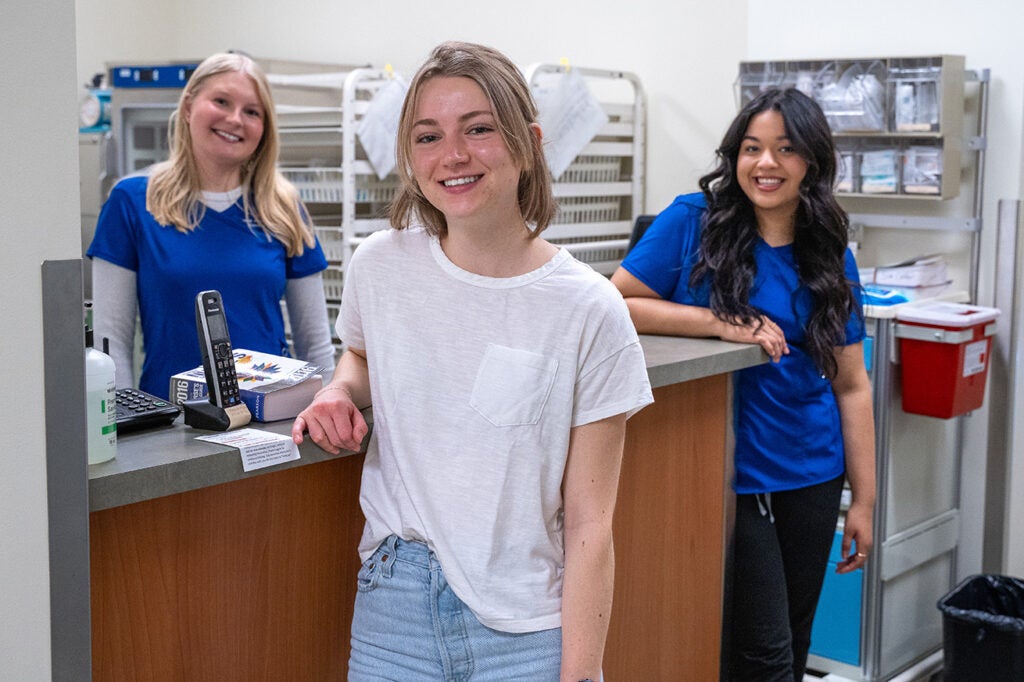Ever wonder what it’s like to work as a research assistant (RA) in the School of Nursing?
Many RAs didn’t know what to expect when they signed up, either. “I honestly didn’t know if I would like it,”said junior Isabel McGregor. “But there’s so many benefits to it and it is really cool.”
Junior Cora Serafine is “pretty new to research” she said, and her experience as an RA has been “super self-led”, which she didn’t expect. “In the beginning I felt lost, but now I like it a lot,” she said. In addition to school, she works as a medical assistant at a family medicine practice in Meridian, Idaho; she usually does her RA work on the weekends.

Why sign up to be an RA?
If you ask RAs why they signed-up for the gig, they usually say something along the lines of building relationships and skills that will boost their résumé.
Serafine was hoping for mentorship from faculty, as she’s considering the career of an advanced practice nurse. Serafine researches genomics curriculum with Dr. Molly Prengaman, a nurse practitioner who teaches in the BS-DNP program.
“It’s been cool to have her as someone I can have advice from, not only for research, but other things too,” said Serafine. “I definitely really appreciate her experience caring for patients…It’s really obvious she’s really interested and excited about it. So I think her attitude towards education, nursing, genomics, everything has just been really encouraging to me. I’ve really enjoyed that.”

Isabel McGregor saw being an RA as an opportunity to get more involved.
“I felt like it would be cool to contribute to something bigger and that would benefit the program,” McGregor said. “And then also just connecting with professors and building relationships outside the classroom.”
She feels like the experience has given her a whole new perspective from her professors.
“I feel like I’ve gained a whole different perspective, their perspective of research or their career path–something that we wouldn’t necessarily get inside the classroom–and just like connecting with them on a more personal level,” McGregor said. “We are seeing each other more often and meeting with each other in a more one-on-one space…I feel like you just gain so much more and we can relate to each other better.”
“It’s really nice to have a closer connection with a professor through the research,” said junior Grace Ellison. “I just feel more connected to the program in that sense, because I feel like I have another support.”
How does it work?
When students sign up to be an RA, they’re paired with faculty to work on their projects. One thing Ellison appreciated, though, was how the School of Nursing keeps students’ interests in mind when assigning them to faculty projects.
“We get to focus on something we would be more interested in, so then it’s more like we’re passionate about it, and we want to work on it,” Ellison said.

RAs do most of their work independently, at home, on their own time.
“I’m just not one of those people that necessarily does that well,” said McGregor. “But seeing other RAs or classmates do their work and get published or present it is really motivating. I think that’s one of the most rewarding parts of it, honestly, and it kind of helps me get my work done.”
In addition to being motivated by her peers’ success, McGregor also appreciates hearing about the various projects of other RAs.
“Everyone’s research and what work they’re doing is just so different,” she said. “Which is really cool and very unique to each person and their experience in the program.”
Benefits and Challenges
Research can take a long time – it’s often not like a class assignment that is both started and finished in less than a few months – and it can be difficult to stay motivated during the process.
Whether students are starting new projects, presenting their results, or somewhere in between, “I feel like that’s why I have to look to my peers and see what they’ve accomplished so far so I can really stay motivated to continue with my own work,” McGregor said.
Being an RA doesn’t just teach students how to build an evidence table or comb literature for relevant background information.
“I feel like it is building critical thinking and thinking beyond the things right in front of you,” said Ellison.
“I think it’s really helped my skills as a student nurse,” Serafine said.
“It’s really taught me how to ask more questions about things I read, like clinical outcomes, interventions, or things like that,” Serafine said. “It’s taught me a lot.”
Considering being an RA? Here’s their advice
Like many opportunities in life, “you’ll definitely get out of the program, and being an RA, whatever you put in,” McGregor said. “And since you are working on your own, the hours and the amount of effort you put in is really up to you.”
Ellison noted how professors take students’ workloads into consideration and how flexible they are with project deadlines.
“Just keep your mind open to it, and if you have the time, go for it,” she said. “I’ve really enjoyed it and I haven’t heard of anyone who hasn’t enjoyed it. So, it’s a great experience.”